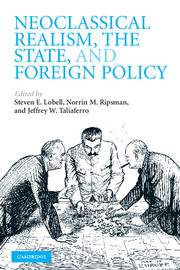Book contents
- Frontmatter
- Contents
- List of figures
- List of tables
- List of contributors
- Acknowledgments
- 1 Introduction: Neoclassical realism, the state, and foreign policy
- 2 Threat assessment, the state, and foreign policy: a neoclassical realist model
- 3 Neoclassical realism and strategic calculations: explaining divergent British, French, and Soviet strategies toward Germany between the world wars (1919–1939)
- 4 Neoclassical realism and identity: peril despite profit across the Taiwan Strait
- 5 Neoclassical realism and the national interest: presidents, domestic politics, and major military interventions
- 6 Neoclassical realism and domestic interest groups
- 7 Neoclassical realism and resource extraction: State building for future war
- 8 Neoclassical realism and state mobilization: expansionist ideology in the age of mass politics
- 9 The limits of neoclassical realism: additive and interactive approaches to explaining foreign policy preferences
- 10 Conclusion: The state of neoclassical realism
- Index
- References
6 - Neoclassical realism and domestic interest groups
Published online by Cambridge University Press: 05 June 2012
- Frontmatter
- Contents
- List of figures
- List of tables
- List of contributors
- Acknowledgments
- 1 Introduction: Neoclassical realism, the state, and foreign policy
- 2 Threat assessment, the state, and foreign policy: a neoclassical realist model
- 3 Neoclassical realism and strategic calculations: explaining divergent British, French, and Soviet strategies toward Germany between the world wars (1919–1939)
- 4 Neoclassical realism and identity: peril despite profit across the Taiwan Strait
- 5 Neoclassical realism and the national interest: presidents, domestic politics, and major military interventions
- 6 Neoclassical realism and domestic interest groups
- 7 Neoclassical realism and resource extraction: State building for future war
- 8 Neoclassical realism and state mobilization: expansionist ideology in the age of mass politics
- 9 The limits of neoclassical realism: additive and interactive approaches to explaining foreign policy preferences
- 10 Conclusion: The state of neoclassical realism
- Index
- References
Summary
Neorealists, with their focus on the international structure and the relative capabilities of the great powers, have tended to neglect the impact of domestic political forces – such as public opinion, the legislature, and privileged interest groups – on foreign security policy. Recently, however, a new generation of realists has begun to draw upon the comparative political economy literature to account for the impact of domestic political considerations and to introduce the problematique of state autonomy to security studies. As chapter 1 indicates, though, this neoclassical realist literature is still underdeveloped. In particular, it needs to address five critical questions about the role of domestic actors in determining policy: (1) Which domestic actors matter most in the construction of foreign security policy? (2) Under what international circumstances will they have the greatest influence? (3) Under what domestic circumstances will domestic actors have the greatest influence? (4) In what types of states will they matter most? (5) How is their influence likely to manifest itself? In this chapter, I provide preliminary answers to these questions with the goal of building a theory of domestic actors and the national security state, although I do not build such a theory here. Specifically, I explain when domestic political factors affect foreign security policy and which domestic groups and actors matter most.
- Type
- Chapter
- Information
- Neoclassical Realism, the State, and Foreign Policy , pp. 170 - 193Publisher: Cambridge University PressPrint publication year: 2009
References
- 46
- Cited by



